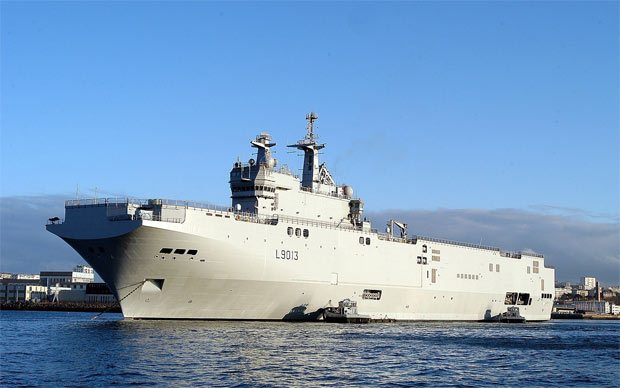After cancelling the sale to Russia, France finds itself lumbered with two giant Mistral warships which it will find “extremely difficult” to re-sell and cannot afford to keep, say experts.
The pair of 200-metre (650-foot) amphibious helicopter-carriers were due for delivery to Russia by the end of this year in a deal worth an estimated 1.2 billion euros ($1.3 billion).
Instead, they are docked in the western French port at St Nazaire after Paris put the deal on ice in response to Russia’s aggression in Ukraine last year.
The deal was formally cancelled on Wednesday, and within hours French Defence Minister Jean-Yves Le Drian said “several” countries had expressed an interest in buying the ships, without giving details.
“It’s desirable that we sell them as quickly as possible,” he told RTL radio.
But experts say France will have its work cut out in offloading them.
“Selling someone ships these days is extremely difficult,” said Ben Moores, a defence analyst for IHS Jane’s in London.
“They will have to seriously cut their price to make it attractive to another country. It could take years.”
However, French President Francois Hollande doesn’t see it that way.
“There will be no difficulty in finding buyers,” Hollande told reporters Thursday about selling the two Mistrals, speaking in Egypt where he attended a ceremony for the extension of the Suez Canal waterway.
Plenty of militaries are in need of new warships — IHS Jane’s estimates there are 13 countries needing a total of 26 amphibious assault vessels over the next decade.
In theory, Moores said, the Mistrals are very sellable “because the only big thing Russia changed is they put their own communications system onboard, which is not hard to take out these days.”
But most countries with the money and desire to buy boats of that size have their own ship-building industries.
“The problem France will have to overcome is domestic ship-building lobbies. If a country like Turkey decides to buy these ships, that would mean thousands of people would be laid off from a shipyard,” said Moores.
“And there’s a question of national pride in saying ‘we build our own ships’.”
‘Absolutely have to sell’
Meanwhile, France already has three Mistrals in its fleet, and doesn’t have the funds to add two more.
“Keeping them would mean not only paying for them, but also making them run — creating crews, docking them, maintaining them,” said a senior procurement officer in the French military, who was not authorized to give his name.
“We absolutely have to sell them.”
But only a handful of countries will be able to make use of them, said Admiral Alain Coldefy, a former inspector general of the French military.
“We need countries that want to intervene in the world… with the resources to buy such sophisticated, top-of-the-line boats. They also need well-trained crews.”
He said the ideal situation would be for the European Union to purchase them, but years of effort to bolster Europe’s collective defence have made little headway.
An added problem for France will come when Russia comes to dismantle its communications equipment.
“The Russians will no doubt take their time in a bid to steal as much technology as possible, as usual,” said Coldefy.
“They say they can make these boats themselves, but really they are far behind.”
According to IHS Jane’s, the 13 countries needing a warship in the next decade — and with any hope of buying one from France — are Australia, Belgium, Brazil, Canada, Chile, Germany, India, Japan, Malaysia, The Netherlands, Singapore, Turkey and Venezuela.
Of those, only India and Turkey need a ship in the next four years, and New Delhi recently said it would stop importing warships and try to make its own, while Ankara aims to become a net exporter of naval vessels.
“Others could come up,” said Moores. “Especially associated with tensions in the South China Sea” where China’s claim to regional control have raised concerns among its neighbors.
“But only a few of these ships get sold every year, so it’s going to be tough.”











